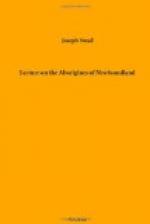METHOD OF INTERMENT.
The Boeothicks appear to have shown great respect for their dead, and the most remarkable remains of them commonly observed by Europeans at the sea coasts are their burial places. They had several modes of interment—one was when the body of the deceased had been wrapped in birch rind, it was then, with his property, placed on a sort of scaffold about four feet from the ground—the scaffold supported a flooring of small squared beams laid close together, on which the body and property rested.
A second method was, when the body bent together and wrapped in birch rinds was enclosed in a sort of box on the ground—this box was made of small square posts laid on each other horizontally, and notched at the corners to make them meet close—it was about four feet high, three feet broad, and two-feet-and-a-half deep, well lined with birch rind, so as to exclude the weather from the inside—the body was always laid on its right side.
A third, and the most common method of burying among this people, was to wrap the body in birch rind, and then cover it over with a heap of stones on the surface of the earth; but occasionally in sandy places, or where the earth was soft and easily removed, the body was sunk lower in the earth and the stones omitted.
Their marriage ceremony consisted merely in a prolonged feast, and which rarely terminated before the end of twenty-four hours. Polygamy would seem not to have been countenanced by the tribe.
Of their remedies for disease, the following were those the most frequently resorted to:—
For pains in the stomach, a decoction of the rind of the dogberry was drank.
For sickness among old people—sickness in the stomach, pains in the back, and for rheumatism, the vapor-bath was used.
For sore head, neck, &c., pounded sulphuret of iron mixed up with oil was rubbed over the part affected, and was said generally to effect a cure in two or three days.
Brief as the foregoing statement is, yet, so scanty are the materials which relate to the subject, that it contains substantially all the facts which can now be gathered together of that interesting people, the original inhabitants of Newfoundland—a people whose origin and fate are alike shrouded in mystery, and of whom, in their passage across the stage of life, but little is certainly known, beyond the cruel outrages, the bitter wrongs they endured at the hands of the white man—before whose power, so mercilessly used, the tribe sank, and was either utterly annihilated, or, as is more probable, a remnant—worn out, harrassed beyond human endurance—left the homes of their fathers, and in another land sought that security for their lives which was denied them in this.




